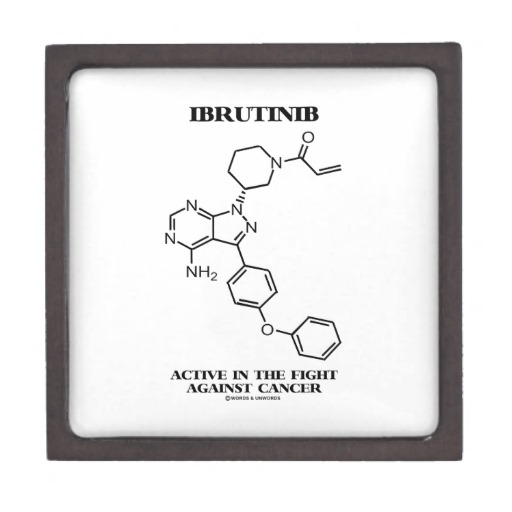Chronic lymphocytic leukemia (CLL) is a slow-growing cancer in which a large number of immature lymphocytes (white blood cells) are found mostly in the blood and bone marrow. It is the most common leukemia in the Western world with incidence rates as high as ~4 per 100,000 individuals in the USA. According to the National Cancer Institute (NCI) it is estimated that in 2013, approximately 15,680 people (9,720 men and 5,960 women) will be diagnosed with CLL and 4,580 men and women will die of CLL. Even though few durable remissions were noted following treatment with chemotherapeutic agents such as chlorambucil, cyclophosphamide, and fludarabine, in the majority of cases these agents are effective for palliation but do not improve survival. An alternative treatment option using chemoimmunotherapy (combination of a chemotherapeutic agent with an anti-CD20 antibody rituximab) was found to have limited efficacy and increased toxicity. In addition, treatment options for CLL are further limited by lack of common genetic target. Nonetheless, many studies reported the association of B-cell receptor (BCR) signaling in the survival of CLL tumor-cells. A downstream component of BCR signaling, a receptor tyrosine kinase, Burton’s tyrosine kinase (BTK) was noted for activation of the Akt, ERK, NF-κB pathways associated with CLL-cell survival.
Bruton’s tyrosine kinase is essential for B-cell development and function. BTK deficiency in man or mice results in the B-cell specific immunodeficiencies X-linked agammaglobulinemia (XLA) or x-linked immune deficiency (xid), respectively. It is also implicated in the pathogenesis of B-cell cancers. Studies suggest that the levels of BTK represent a rate-limiting step in BCR signaling and thereby B-cell activation and survival. Therefore, inhibition of BTK in CLL could serve as an effective treatment strategy. In vitro studies reported that following inhibition of BTK with selective inhibitor CLL cells lose their resistance to apoptosis. Preclinical studies also demonstrated that that BTK-deficiency completely abrogated CLL development in mice. With the accumulating evidence of the role of BCR pathway involving BTK in CLL, first targeted therapeutic approach for CLL was tested clinically with BTK inhibitors. A study published recently in The New England Journal of Medicine (July 4, 2013) by Byrd et al. reported a high frequency of durable remissions in patients with relapsed or refractory CLL with a BTK inhibitor, ibrutinib. A phase I study of ibrutinib (previously known as PCI-32765) showed mild-to-moderate toxicity and clinical antitumor activity in patients with relapsed or refractory B-cell cancers; 11 of the 16 patients in the study had CLL or small lymphocytic lymphoma. These preliminary results prompted the initiation of a phase Ib–II study of ibrutinib in CLL; this study involved two different therapeutic doses in patients with relapsed or refractory disease.
With the accumulating evidence of the role of BCR pathway involving BTK in CLL, first targeted therapeutic approach for CLL was tested clinically with BTK inhibitors. A study published recently in The New England Journal of Medicine (July 4, 2013) by Byrd et al. reported a high frequency of durable remissions in patients with relapsed or refractory CLL with a BTK inhibitor, ibrutinib. A phase I study of ibrutinib (previously known as PCI-32765) showed mild-to-moderate toxicity and clinical antitumor activity in patients with relapsed or refractory B-cell cancers; 11 of the 16 patients in the study had CLL or small lymphocytic lymphoma. These preliminary results prompted the initiation of a phase Ib–II study of ibrutinib in CLL; this study involved two different therapeutic doses in patients with relapsed or refractory disease.
In the phase Ib-II multicenter study of ibrutinib, Byrd et al. (2013) assessed the safety, efficacy, and pharmacokinetics of this inhibitor in patients with CLL or small lymphocytic lymphoma (ClinicalTrials.gov number NCT01105247). Among 85 patients enrolled in this study, 51 received 420 mg and 34 received 840 mg ibrutinib orally once daily. In both cohorts the overall response rate was 71%. This treatment resulted in durable response were the 26-month estimated progression-free survival was 75% and the rate of overall survival was 83%. The pharmacodynamic study showed that ibrutinib was able to successfully inhibit BTK. However, disease progression was noted in 13% patients during follow-up. The most common toxicities observed during ibrutinib treatment were diarrhea, fatigue, and upper respiratory tract infection.
As compared to other single agent therapies for relapsed CLL this targeted therapy of BTK inhibition exhibited more durable responses. The durable remissions observed in this study suggest that many patients may be treated successfully with ibrutinib.
References:
1. Gribben, J.G. and S. O’Brien, Update on therapy of chronic lymphocytic leukemia. J Clin Oncol, 2011. 29(5): p. 544-50.
2. Advani, R.H., et al., Bruton tyrosine kinase inhibitor ibrutinib (PCI-32765) has significant activity in patients with relapsed/refractory B-cell malignancies. J Clin Oncol, 2013. 31(1): p. 88-94.
3. Byrd, J.C., et al., Targeting BTK with ibrutinib in relapsed chronic lymphocytic leukemia. N Engl J Med, 2013. 369(1): p. 32-42.

